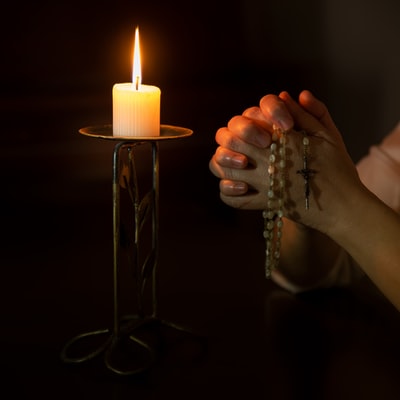Remember it!
Jesus Christ founded Christianity 2000 years ago. Christians believe he was the Son of God whose coming was foretold in the Old Testament. God sent Jesus to take the burden of the sins of humanity. Although Jesus died by crucifixion, he was brought back to life by God before ascending to heaven.
- The concept of the Trinity holds that God is divisible into three elements, God the Father, God the Son and God the Holy Spirit.
- Jesus was born to Mary in a virgin birth after she was visited by the Angel Gabriel. This visit is known as the Annunciation.
- Jesus spent his adult life preaching the word of God along with the 12 disciples.
- His teachings upset the Pharisees, the religious authorities in the area of Nazareth where he preached. They regarded his teachings, and the miracles he performed, as heresy and plotted to kill him.
- When he was around 30 years old, Jesus was betrayed by one of his own disciples, Judas Iscariot. The Roman Pontius Pilate ordered his execution by crucifixion.
- Christian teaching says that a belief in Jesus and God, leading a moral life and repenting from sin allows salvation, life after death and entry to Heaven.
- The first ceremony for Christians is baptism, which usually happens during infancy. Confirmation comes in late childhood or early teens, when the initiate is old enough to understand the implications of being a member of the Christian Church.
Most churches have a representation of Jesus on the cross and many, especially Catholic churches, also have images of the Virgin Mary. Most churches have a pulpit for readings and preaching.
- Pilgrims make a journey to a holy place to show their devotion to God. Places of pilgrimage include Canterbury in England, Lourdes in France and Santiago de Compostela in Spain.
- Most Christians celebrate Holy Communion, also known as the Eucharist, Mass and the Lord’s Supper. Holy Communion originates from Christ’s Last Supper when he gave bread and wine to the disciples and told them it was his flesh and blood.
- The Sabbath tradition comes from the Book of Genesis in the Old Testament. After creating the world in six days, God rested on the seventh, the Sabbath. Christians observe the Sabbath on Sunday.
- Christmas (December 25th for most Christians but January 7th for the Orthodox Church) celebrates the birth of Jesus, known as the Nativity.
- Lent starts on Ash Wednesday and lasts for the 40 days before Easter. Palm Sunday, on the Sunday before Easter, marks the triumphal entry of Jesus to Jerusalem. Easter marks the crucifixion of Jesus on Good Friday, his resurrection and his ascension to heaven.
——————————————————
Test it!
1) What are the Gospels?
2) Describe the Annunciation.
3) Describe Christian methods of Baptism.
4) Explain pilgrimage and name three places of pilgrimage.
5) What is the difference between liturgical and non-liturgical worship?
6) What is the origin of Holy Communion?
7) Describe the ceremony of Holy Communion.
8) What is the origin of the Sabbath?
9) Describe the significance of Christmas.
10) Describe the significance of Easter.
——————————————————
Some top tips!
- Print out the Test It! Questions – it will allow you to replicate exam conditions and also allows you to give your eyes a rest from the computer screen whilst doing your crucial revision.
- Make a copy of the Remember It! Section and put in a place that you often look at. i.e. front of a journal, next to a mirror, on a kitchen cupboard door, etc. That way you can do some cheeky religious studies revision whilst doing those things you have to do!
——————————————————
 Jesus Christ founded Christianity 2000 years ago. Christians believe he was the Son of God whose coming was foretold in the Old Testament. God sent Jesus to take the burden of the sins of humanity. Although Jesus died by crucifixion, he was brought back to life by God before ascending to heaven.
Jesus Christ founded Christianity 2000 years ago. Christians believe he was the Son of God whose coming was foretold in the Old Testament. God sent Jesus to take the burden of the sins of humanity. Although Jesus died by crucifixion, he was brought back to life by God before ascending to heaven. Most churches have a representation of Jesus on the cross and many, especially Catholic churches, also have images of the Virgin Mary. Most churches have a pulpit for readings and preaching.
Most churches have a representation of Jesus on the cross and many, especially Catholic churches, also have images of the Virgin Mary. Most churches have a pulpit for readings and preaching.